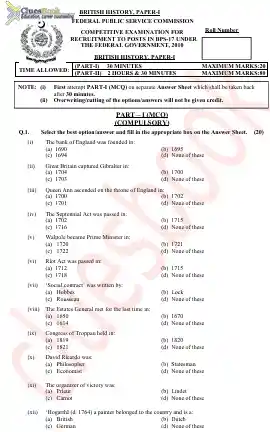CSS Past Papers
Download British History Past Papers CSS 2010 PDF with insights on paper format, recurring themes, examiner’s expectations, and preparation tips for aspirants aiming to excel in the CSS exam.

The British History CSS 2010 past paper provides a clear look into how questions are structured and what topics are prioritized. For students appearing in the CSS exam, reviewing past papers is one of the most effective strategies to understand examiner expectations and recurring historical debates. This paper in particular focused on analytical thinking, historical interpretation, and the ability to connect events with long-term impacts.
Paper Layout
The structure of the 2010 paper followed the usual CSS pattern, requiring candidates to attempt questions with critical analysis. The balance between political history, social change, and international relations made the paper diverse yet challenging.
- Questions covering Tudor and Stuart periods
- Analytical queries on British imperialism
- Essays demanding connections between reforms and outcomes
- Focus on historiography and cause-effect relationships
About the CSS
The CSS (Central Superior Services) Competitive Examination is a rigorous federal-level test administered by the Federal Public Service Commission (FPSC) to select candidates for prestigious civil service roles across Pakistan. The exam’s rules and regulations, covering age limits, eligibility, subjects, and quotas, are detailed in the official CSS Rules section on the FPSC’s website.
The CSS Exam Rules, issued by FPSC Pakistan, outline eligibility criteria, age limits (21–30 years), and a maximum of three attempts for candidates. The exam includes written tests, a medical exam, a psychological assessment, and an interview. Rules also define quotas, disqualification grounds, and subject selection for a fair recruitment process.
Core Areas Covered in 2010
The CSS British History 2010 paper revolved around major developments in British governance, society, and foreign policy. Some key areas included:
- The evolution of parliamentary democracy
- The role of monarchy and its limitations
- Industrial and social transformations in Britain
- Colonial expansion and decline
- Impact of wars on British society and politics
British History Past Papers CSS 2010 – Examiner’s Perspective
The examiner’s intent in 2010 was not just to test factual memory but to measure how candidates could critically engage with historical debates. Aspirants were expected to:
- Compare historical figures and policies
- Evaluate reforms in political and social contexts
- Link British history with global consequences
- Provide balanced arguments with evidence
Why Study This Paper?
The 2010 paper holds value for CSS aspirants because it combines factual recall, conceptual clarity, and critical analysis. Studying it helps candidates practice how to structure answers logically, support arguments with historical evidence, and address the “why” behind events rather than just the “what.”
Recommended Preparation Tips
To prepare effectively using this past paper:
- Review standard books on British political and social history
- Make timelines for monarchs, reforms, and wars
- Practice writing analytical answers within time limits
- Study examiner reports to understand common mistakes
- Use this paper as a model to test your readiness
Download British History CSS Past Papers 2010
You can download the original CSS 2010 British History Paper (PDF) from the link below. It’s unsolved and formatted for practice purposes, making it a reliable study aid. The British History CSS 2010 past paper is a valuable guide for candidates to understand how the subject is tested. It reflects the balance between detailed knowledge and critical interpretation, both of which are essential for scoring well in the exam.
Consistent practice with such papers strengthens analytical writing and boosts confidence before the final attempt.

